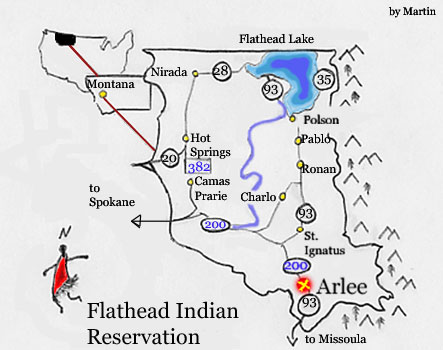 |
Canku Ota
|
 |
|
(Many Paths)
|
||
|
An Online Newsletter
Celebrating Native America
|
||
|
April 1, 2010 - Volume
8 Number 4
|
||
|
|
||
|
New Push Begins To
Save Salish Language
|
||
|
by David Flores - Lake
Country (Polson, MT) Leader
|
||
|
credits: photo courtesy
of Michael Crummett.
|
|
FLATHEAD RESERVATION - In an effort to revitalize the Salish language, members of the Salish Tribe are holding monthly meetings to discuss reorganization of language teaching and initiatives to encourage use of the native language. During the fifth meeting, held March 3 at the Salish-Pend d'Oreille culture committee building, a plan of action was submitted for elder approval.
Linda Ferris, who is training to be a Salish language teacher with the Native American Language Teacher Training Institute at the Salish Kootenai College, said the meetings are a way to coordinate a variety of efforts to teach the Salish language. Everyone has to be on board, she explained, including the Nk'wsum Immersion School, the Salish Kootenai College and the Native American Language Teacher Training Institute. "It takes more than one person to revitalize Salish," Ferris said. "We need to educate people. We cannot put all our eggs in one basket." Attendees of the March meeting discussed six points: collaborating and organizing efforts to teach the Salish language, integrating Salish into everyday life, educating the core of tribal government and the media about the importance of the language, gaining funding for language teaching programs, using Salish in education systems and identifying community strengths. "We've never been in this situation where we are trying to teach the language, it's always been a part of our lives," said Tony Incashola, director of the Salish-Pend d'Oreille Culture Committee. "Some elders take for granted that the next generation will know the language, but we're finding out that that's not the case." The meetings began because tribal members, including those in the Salish Culture Committee, agreed that it was ineffective to teach the language through disparate groups and methods, and that consolidating efforts within the tribes would benefit the spread of the Salish language. "Over the years, we had seen different attempts to go about learning Salish, and there needs to be some sort of working system," Incashola said. One of the challenges of teaching and learning Salish is that classes are limited. Beyond the introductory level, intermediate courses are scarce, said Joshua Brown, Native American Language Teacher Training Institute director. One goal of the revitalization effort is to develop curriculum materials for advanced learning. "Another obstacle is that it's an endangered language and there's just a low number of speakers," Brown said. "You can't go to the library and pick up materials. There's no Salish radio, no Salish TV and very few meetings or social gatherings to hear Salish." Less than 50 people speak the language fluently, in addition to those speakers with varying degrees of familiarity who aren't considered fluent. Over the years, the culture committee has seen people learn the language in various ways without much progress in increasing the number of fluent speakers, Incashola said. As part of the research for how to better spread the Salish language, members of the Salish Culture Committee consulted the Pend d'Oreille Tribe in Kalispell to learn about an alternative method of teaching that emphasizes learning while teaching, Incashola said. "It's a work in progress. Language is very difficult. Language is something that takes time and dedication," Incashola said of the meetings, which are still in the planning stages. "We are just hoping to get enough continuity and people doing the same thing that [the language] will spread." Brown said recent interest in the language has been spearheaded by a group of to 30-year-olds who are interested in making Salish more accessible to learn. "The elders are just tickled that so many people are interested in teaching and revitalizing the language. Our culture exists in our language," Incashola said. Incashola said the meetings so far have been an achievement in themselves. "Any good communication is success," he said. "If the teachers, learners and elders continue to meet and communicate, the Salish language will be revitalized." |
 |
|
|
||
|
|
||
| Canku Ota is a free Newsletter celebrating Native America, its traditions and accomplishments . We do not provide subscriber or visitor names to anyone. Some articles presented in Canku Ota may contain copyright material. We have received appropriate permissions for republishing any articles. Material appearing here is distributed without profit or monetary gain to those who have expressed an interest. This is in accordance with Title 17 U.S.C. Section 107. | ||
|
Canku Ota is a copyright ©
2000, 2001, 2002, 2003, 2004, 2005, 2006, 2007, 2008, 2009, 2010
of Vicki Barry and Paul Barry.
|
||
 |
 |
|
|
The "Canku
Ota - A Newsletter Celebrating Native America" web site and
its design is the
|
||
|
Copyright ©
1999, 2000, 2001, 2002, 2003, 2004, 2005,
2006, 2007, 2008, 2009, 2010
of Paul C. Barry.
|
||
|
All Rights Reserved.
|
||
